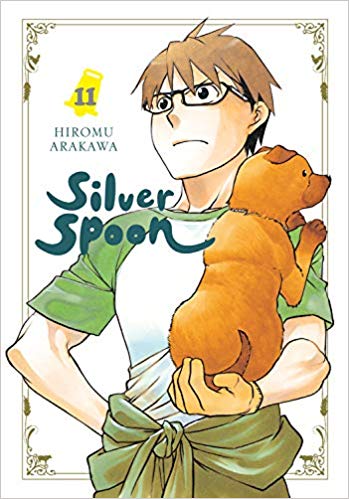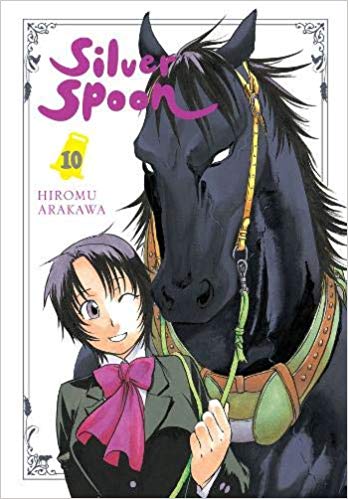By Hiromu Arakawa. Released in Japan as “Gin no Saji” by Shogakukan, serialized in the magazine Weekly Shonen Sunday. Released in North America by Yen Press. Translated by Amanda Haley.
You can tell that the new year is starting in Silver Spoon because there’s a new freshman, and she’s interested in horses. This despite being in the dairy program. Again, it’s great to see that even at an agricultural school like Ezo, you don’t have to necessarily be slotted into the drawer that your family farm and/or business puts you in. It also once again shows the value of trying even after failure (she tried to get in on the science track, failed, and tried again on the ‘general’ track), which is good, as Hachiken is also dealing with some repeated failures in his life as well. On the positive side, his father is reading his business proposals and taking them seriously. On the negative side, they’re still not good enough, and he’s still not investing any money in them. That could change as we see the start of something that seems obvious but was never thought of much before: Hachiken needs to earn money and invest in his own business.
Of course, sometimes taking that once-in-a-lifetime chance can also lead to failure in the end – there’s a two-week student program in France that’s offered to Hachiken but he passes it on to cheese-loving Yoshino, who jumps at it… and then finds that for the two weeks, she’s at a high school specializing in fish. And yet, even with this obvious punchline, she manages to eat lots of French cheese and has a better idea about the direction she wants to go in. Any experience is good experience if it can show you a better way forward. That also applies to Komaba, who9 still has everyone telling him not to simply give up and abandon all his dreams, including his own family, and Mikage – indeed, the scene between him and Mikage is possibly the best in the volume.
As for Hachiken, he’s sticking with what he knows best – which is to say, pigs. Pigs and pizza. The section of the book dealing with pasturing pigs, free-range style, is fascinating, as with most of the “here is how you do agriculture” stuff in this series. He’s also found a way to solve the problem of Ookawa’s ongoing awfulness – hire him as company president, as when he’s working he’s far more reliable. It’s a character development that makes sense and is hilarious. As for romance, well, it’s pretty much on the back burner until Mikage manages to get into college – though that’s not stopping others (Sakae) from trying to get them to “go all the way”. And there’s also a suggestion that more equestrian action may be in his future – this despite the fact that he’s not picked for the preliminaries. They’re saving him! Again, seeing Hachiken from Vol. 1 and comparing him to this Hachiken is like night and day.
I’m not sure what to add. Another very good volume in a stellar series. Read it.




